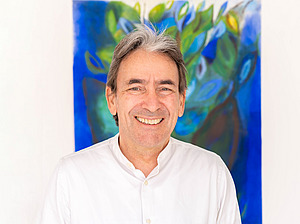"Building up living soil is crucial here in Egypt, too"
Voices on climate
Helmy Abouleish is the second generation to run the successful Sekem centre not far from Cairo. Here in the desert, he practises biodynamic agriculture, which has been seeking progressive ways of dealing with climate change for decades. (Photo: made available)
Helmy Abouleish is the managing director of the Egyptian Sekem Holding, not far from Cairo. The company successfully practises biodynamic agriculture, processes and markets products, and motivates farmers to convert to this method. Sekem's goals include social entrepreneurship and a commitment to combating climate change and promoting food security. Under Abouleish's leadership, Sekem has been awarded the Alternative Nobel Prize, among other honours. Abouleish has also been president of Demeter International since 2018.
Sekem is a pioneer in organic farming in Egypt. Since 1977, the company has been promoting sustainable development in the areas of ecology, economy, society and culture. The Sekem Holding produces, processes and markets biodynamic food, textiles and medicines in Egypt and internationally.
From Austria back to Egypt
Helmy Abouleish is the son of Sekem founder Ibrahim Abouleish. In 1977, Ibrahim returned from a secure middle-class existence in Austria to his former home in Egypt to establish biodynamic agriculture there. Many thought he was crazy. However, the results prove the doubters wrong. The second generation at Sekem has also played a significant role in this. Helmy Abouleish has successfully developed and expanded his father's work.
Helmy Abouleish was recently a prominent guest on the 100th episode of the FiBL Focus podcast. We have summarised excerpts from the conversation with a focus on dealing with climate change.
Your father started practising biodynamic agriculture in 1977. How did he come up with this idea?
My father, a native of Egypt, travelled from Egypt to Austria in the 1950s to study. After completing his studies, he worked there and married my mother. My sister and I were born one after the other. We were very well settled in the green heart of Europe, but around 1974/75, my father began to look back at his homeland more and more and wondered how he could contribute to sustainable development there. The dream of biodynamic agriculture in the desert was born, although everyone around him agreed that it was impossible. Fortunately, he did not let this deter him from his idea, and in 1977, we moved with the whole family to Egypt and set up an organic farm on 70 hectares, 60 kilometres northeast of Cairo.
What experiences have you had at Sekem with climate-resilient agriculture, especially in a region that is severely affected by the climate crisis?
We are experiencing a variety of impacts of climate change on agriculture here. One is changes in the weather, including changes in humidity and temperature and so on. This naturally changes what I can grow and when. And here we can see very clearly that our biodynamic olives, mangoes and other crops are more resilient than those of many commercial colleagues, who suffer more from all these environmental influences.
Then, of course, there is the question of what will happen with rising sea levels. More than half of Egypt's population lives and works in the vast Nile Delta, where all of the agricultural land is concentrated, and this land is currently being washed away by the sea. This leads to salinisation and other consequences. And here, too, we can see that we can cope better with these environmental conditions with biodynamic farmers in the northern part of Egypt.
And the third issue is water consumption, which is becoming the most acute problem of all due to the climate in Egypt. With organic farming, we have proven to have lower losses and thus lower water consumption thanks to living soils, which of course makes us much more resilient than the people around us, who need much more water and suffer much more from water poverty than we do.
In terms of water storage capacity and CO2 storage capacity, humus formation is also very important. What role does this issue play for you?
Building living soil is, of course, central to organic and biodynamic farming everywhere in the world, and here in Egypt is no exception. If you combine this with agroforestry, more trees, good composting and a switch to renewable energies, you can make a decisive difference in terms of emissions. A large proportion of global emissions come from agriculture. If we can now show that, as biodynamic farmers in Egypt, we are binding CO2 or preventing emissions instead of causing them, then we can derive additional ecosystem services from this, such as carbon certificates, and thus enable the farm to generate income with which it can finance the entire conversion. We are currently converting around 40,000 farms. There is an exchange for the certificates, where Egyptian companies can reduce their carbon footprint by purchasing them.
Interview: Vanessa Gabel, edited by Adrian Krebs
Further information
Links
- sekem.com: Sekem website
- fibl.org: Podcast with Helmy Abouleish (in German)




